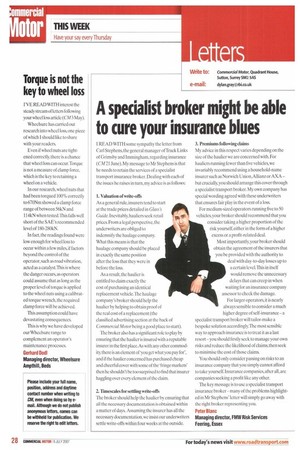A specialist broker might be able to cure your insurance blues
Page 30

If you've noticed an error in this article please click here to report it so we can fix it.
I READ WITH some sympathy the letter from Carl Stephens, the general manager of Truck Links of Grimsby and Immingham, regarding insurance (CM 21 June). My message to Mr Stephens is that he needs to retain the services of a specialist transport insurance broker. Dealing with each of the issues he raises in turn, my advice is as follows: 1. Valuation of write-offs As a general rule, insurers tend to start at the trade prices detailed in Glass:5 Guide. Inevitably, hauliers seek retail prices. From a legal perspective, the underwriters are obliged to indemnify the haulage company. What this means is that the haulage company should be placed in exactly the same position after the loss that they were in before the loss.
As a result, the haulier is entitled to claim exactly the cost of purchasing an identical replacement vehicle.Tbe haulage company's broker should help the haulier by helping to obtain proof of the real cost of a replacement (the classified advertising section at the back of Commercial Motor being a good place to start).
The broker also has a significant role to play by ensuring that the haulier is insured with a reputable insurer in the first place. As with any other commodity, there is an element of 'you get what you pay for', and if the haulier concerned has purchased cheap and cheerful cover with some of the 'fringe markets' then he shouldn't be too surprised to find that insurer haggling over every element of the claim.
2. Timescales for settling write-offs The broker should help the haulier by ensuring that all the necessary documentation is obtained within a matter of days. Assuming the insurer has all the necessary documentation, we insist our underwriters settle write-offs within four weeks at the outside. 3. Premiums following claims My advice in this respect varies depending on the size of the haulier we are concerned with. For hauliers running fewer than five vehicles, we invariably recommend using a household-name insurer such as Norwich Union, Allianz or AXA — but crucially, you should arrange this cover through a specialist transport broker. My own company has special wording agreed with these underwriters that ensures fair play in the event of a loss.
For medium-sized operators running five to 50 vehicles, your broker should recommend that you consider taking a higher proportion of the risk yourself, either in the form of a higher excess or a profit-related deal.
Most importantly, your broker should obtain the agreement of the insurers that you be provided with the authority to deal with day-to-day losses up to a certain level.This in itself would remove the unnecessary delays that can creep in when waiting for an insurance company assessor to check the damage.
For larger operators, it is nearly always sensible to consider a much higher degree of self-insurance— a specialist transport broker will tailor-make a bespoke solution accordinglyThe most sensible way to approach insurance is to treat it as a last resort— you should firstly seek to manage your own risks and reduce the likelihood of claims, then seek to minimise the cost of those claims.
You should only consider passing on risks to an insurance company that you simply cannot afford to take yourself. Insurance companies, after all, are companies seeking a profit like any other.
The key message is to use a specialist transport insurance broker —many of the problems highlighted in Mr Stephens' letter will simply go away with the right broker representing you.
Peter Blanc Managing director, FMW Risk Services Feering, Essex






























































































































































































